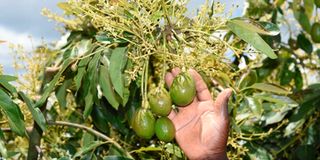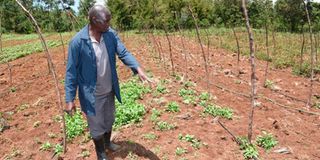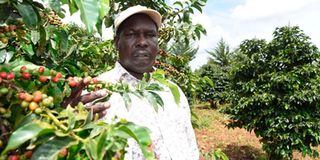Premium
North Rift farmers reap fruits of switching from exclusive maize farming

In a region known predominantly for maize, most cereal growers viewed it as a ploy by the political class to throw them out of the grain business so as to provide an opportunity for ‘cartels’ to import grains.
When a campaign urging farmers to diversify their crops kicked off in the North Rift three years ago, it was met with hostility and rebellion.
In a region known predominantly for maize, most cereal growers viewed it as a ploy by the political class to throw them out of the grain business so as to provide an opportunity for ‘cartels’ to import grains.
However, three years later, those who had heeded the calls and diversified are now saying they made the best decision ever in their farming life.
In Tuiyo village in Uasin Gishu county, Paul Keter ventured into coffee, macadamia and avocado farming and as he waits to start making a killing in the latter two crops, he is earning his livelihood from coffee.
He has a three-acre coffee plantation with 2,600 trees. He gets 300-400kg per harvest, which he says is lucrative, unlike maize farming.
Whereas a kilogram of maize goes for between Sh100 and Sh120, coffee sells for Sh645, making it attractive.
“There is a ready market for coffee with good prices, unlike maize, which farmers struggle to get to the market with poor prices because the market is flooded by imports,” he said.
“The good thing with coffee is that it takes three years to mature and then you harvest twice a year. Initially, I started with half an acre but now I have increased it to three acres.”
Before diversifying, Mr Keter used to grow maize on 30 acres, but because coffee is bringing more profits to him, he reduced acreage under maize to 10.
He said earnings from maize, the main source of food for most households, had declined due to rising costs of farm inputs and unstable market prices, rendering investment in the sub-sector unprofitable.
In Kipkabus, Uasin Gishu, Elisha Onzilu grows tree tomatoes, which he says are more profitable than maize.
Tree tomatoes, he said, start earning farmers money after just one year, and thereafter they harvest twice a month for up to seven years.
“I can say tree tomato farming is very profitable compared to any form of farming. If you compare it with animal farming, passion fruit farming, sweet potato farming, cabbage farming or even maize farming, these cannot have the same profits as tree tomatoes. Compared with passion fruit farming, because I also tried it, there are many challenges, such as that it is labour-intensive and prices fluctuate in tree tomatoes compared with other fruits. It can be said to be stable,” he said.

David Rotich, 69, a retired soldier, shows off a section of his farm with passion fruits in Kapsosio village, Moiben Constituency. He has also planted hass avocados, potatoes, passion fruits, vegetables among other crops, away from the traditional maize crop.
From one acre, he said, he can harvest between 1,500-2,000kg, earning over Sh100,000, and with his five acres, he gets between Sh700,000-Sh1,000,000 a month.
Proceeds are dwindling
“In a good season, profits from a hectare are about Sh700,000-Sh1,000,000. Fruit farming is better than the broadly practised maize farming because the profits from fruits will be used in other endeavours but in maize farming, you will keep ploughing back your profits every season to plant more crops,” he said.
This type of farming is quickly gaining momentum in the region as devolved units step in to provide seedlings to the farmers to improve their well-being instead of over-relying on maize, whose proceeds are dwindling.
Most counties in the region have been sensitising cereal growers to venture into coffee, bamboo, avocado and fish farming so as to cushion themselves from the woes that have bedevilled the cereal sector for years.
The devolved units have come up with different initiatives to ensure that maize and tea producers in the region seek alternative farming with high returns.
In Uasin Gishu, which over the years has been dominated by maize production, officials have launched the distribution of assorted seedlings of coffee, avocado, macadamia and tissue cultures worth over Sh42 million.
It has also trained over hundred agriculture extension officers, who are helping farmers to carry out successful diversification.
Governor Jackson Mandago asked farmers to stop relying on maize and instead grow more profitable crops and embrace the use of modern techniques.
He asked farmers to consider growing avocado, macadamia, coffee and other high-value crops.
He said there is a sufficient market for such produce even abroad, and hence the need for farmers to take advantage of it by venturing into farming.
“In Finland, one avocado goes for about Sh500 and take note that this is of the lowest quality, not a fresh one. I was going to Finland for other issues but they were asking if there are avocados here in Kenya that we can import,” said Governor Mandago.
“We need to take advantage of these opportunities by planting more avocados and other cash crops. We should do farming that will bring more money into your pockets.”
“We are distributing coffee, avocado, macadamia and tissue culture seedlings to interested farmers and we encourage them to diversify. The county administration has reached out to some horticultural companies who will purchase the crop harvest from our farmers,” added Deputy Governor Daniel Chemno.

Paul Keter, a farmer in Tuiyo, Kapseret constituency of Uasin Gishu County, who used to be a maize farmer has since diversified to coffee farming.
Completed the construction
Agriculture executive Samuel Yego said: “I wish to encourage the youth to take up coffee and avocado farming, a half an acre of these crops will give you a minimum of a million shillings annually, which is around the same amount of money one makes from 15 acres of maize or wheat in the same period.”
The devolved unit intends to raise the total acreage of land under coffee by 150 acres, avocado by 500 acres and macadamia and bananas by 45 and 115 acres respectively.
Farmers have also received a major boost after the devolved unit completed the construction of a Sh10 million hatchery in partnership with the University of Eldoret.
The county also commenced the distribution of more than 500,000 fingerlings to the farmers in a bid to encourage more residents to venture into fish farming.
In Nandi, officials are working with farmers’ cooperative societies to help revive the high-quality coffee industry and support coffee farming as a sustainable source of income while also preventing soil erosion.
“We have rolled out an ambitious plan to reclaim all our escarpments by introducing and promoting planting of fruit trees and cash crops such as coffee, avocado and macadamia to not only increase food security but to increase land cover and reduce soil erosion and landslides,” said Governor Stephen Sang when he launched the distribution of seedlings recently.
He also recently gave out over 60,000 avocado seedlings and assured farmers that within two years the county will start exporting avocados to the European market, which is huge.
The Agriculture executive Dr Kiplimo Lagat said the devolved unit will continue supplying farmers with new types of avocados, which are in high demand in the international market.
“Within the next two years Nandi will be a leading county exporting avocados and bamboo because the majority of farmers have reduced acreage under maize due to low earnings,” he said.
He also urged farmers to ignore local leaders who have been discouraging farmers from venturing into avocados and bamboo farming.
Dr Lagat said they want farmers and others to invest in bamboo farming for economic growth and shift from maize and livestock farming and diversify.
He said that bamboo is in high demand in China, Japan, India and Korea and farmers need to make maximum use of their land to generate more income and create wealth.
He also disclosed that the county has partnered with the Kenya Water Towers Agency to invest in 1,000 acres of land at the Kibirong wetland in Aldai constituency for bamboo farming meant for export.
“In China, India and Japan, bamboo is used for making furniture, food and carbon, among other benefits,” said the CEC.





